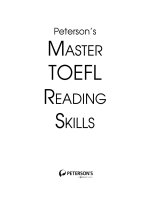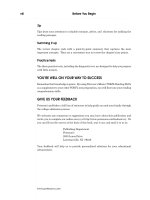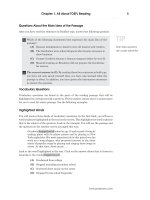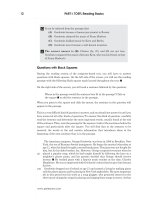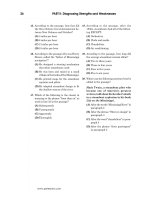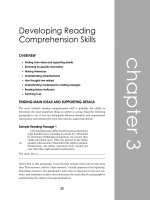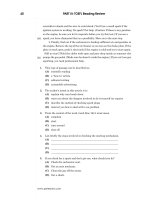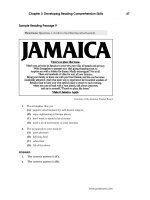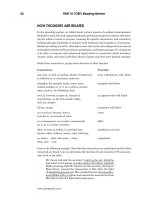Peterson’s master toefl reading skills part 24 pdf
Bạn đang xem bản rút gọn của tài liệu. Xem và tải ngay bản đầy đủ của tài liệu tại đây (71.03 KB, 7 trang )
152 PART V: Appendixes
www.petersons.com
expansive (adjective) broad and large; speaking openly and freely. The actor’s ranch
is located on an expansive tract of land in Texas. Over dinner, she became expansive in
describing her dreams for the future.
expedite (verb) to carry out promptly. As the flood waters rose, the governor ordered
state agencies to expedite their rescue efforts.
expertise (noun) skill, mastery. The software company was eager to hire new graduates
with programming expertise.
expiate (verb) to atone for. The president’s apology to the survivors of the notorious
Tuskegee experiments was his attempt to expiate the nation’s guilt over their
mistreatment. expiation (noun).
expropriate (verb) to seize ownership of. When the Communists came to power in
China, they expropriated most businesses and turned them over to government-
appointed managers. expropriation (noun).
extant (adjective) currently in existence. Of the seven ancient “Wonders of the World,”
only the pyramids of Egypt are still extant.
extenuate (verb) to make less serious. Karen’s guilt is extenuated by the fact that she
was only twelve when she committed the theft. extenuating (adjective), extenuation
(noun).
extol (verb) to greatly praise. At the party convention, speaker after speaker rose to extol
their candidate for the presidency.
extricate (verb) to free from a difficult or complicated situation. Much of the humor in
the TV show I Love Lucy comes in watching Lucy try to extricate herself from the problems
she creates by fibbing or trickery. extricable (adjective).
extrinsic (adjective) not an innate part or aspect of something; external. The high price
of old baseball cards is due to extrinsic factors, such as the nostalgia felt by baseball fans
for the stars of their youth, rather than the inherent beauty or value of the cards
themselves.
exuberant (adjective) wildly joyous and enthusiastic. As the final seconds of the game
ticked away, the fans of the winning team began an exuberant celebration. exuberance
(noun).
facile (adjective) easy; shallow or superficial. The one-minute political commercial
favors a candidate with facile opinions rather than serious, thoughtful solutions.
facilitate (verb), facility (noun).
07_TOEFLReadingAppA,135-176 7/29/06, 12:22152
Appendix A: A Helpful Word List 153
www.petersons.com
fallacy (noun) an error in fact or logic. It’s a fallacy to think that “natural” means “healthful”;
after all, the deadly poison arsenic is completely natural. fallacious (adjective).
felicitous (adjective) pleasing, fortunate, apt. The sudden blossoming of the
dogwood trees on the morning of Matt’s wedding seemed a felicitous sign of good luck.
felicity (noun).
feral (adjective) wild. The garbage dump was inhabited by a pack of feral dogs, which
had escaped from their owners and become completely wild.
fervent (adjective) full of intense feeling; ardent, zealous. In the days just after his
religious conversion, his piety was at its most fervent. fervid (adjective), fervor (noun).
flagrant (adjective) obviously wrong; offensive. Nixon was forced to resign the presi-
dency after a series of flagrant crimes against the U.S. Constitution. flagrancy (noun).
flamboyant (adjective) very colorful, showy, or elaborate. At Mardi Gras, partygoers
compete to show off the most wild and flamboyant outfits.
florid (adjective) flowery, fancy; reddish. The grand ballroom was decorated in a florid
style. Years of heavy drinking had given him a florid complexion.
foppish (adjective) describing a man who is foolishly vain about his dress or appear-
ance. The foppish character of the 1890s wore bright-colored spats and a top hat; in the
1980s, he wore fancy suspenders and a shirt with a contrasting collar. fop (noun).
formidable (adjective) awesome, impressive, or frightening. According to his plaque in
the Baseball Hall of Fame, pitcher Tom Seaver turned the New York Mets “from lovable
losers into formidable foes.”
fortuitous (adjective) lucky, fortunate. Although the mayor claimed credit for the
falling crime rate, it was really caused by several fortuitous trends.
fractious (adjective) troublesome, unruly. Members of the British Parliament are often
fractious, shouting insults and sarcastic questions during debates.
fragility (noun) the quality of being easy to break; delicacy, weakness. Because of
their fragility, few stained glass windows from the early Middle Ages have survived.
fragile (adjective).
fraternize (verb) to associate with on friendly terms. Although baseball players aren’t
supposed to fraternize with their opponents, players from opposing teams often chat
before games. fraternization (noun).
07_TOEFLReadingAppA,135-176 7/29/06, 12:22153
154 PART V: Appendixes
www.petersons.com
frenetic (adjective) chaotic, frantic. The floor of the stock exchange, filled with traders
shouting and gesturing, is a scene of frenetic activity.
frivolity (noun) lack of seriousness; levity. The frivolity of the Mardi Gras carnival is in
contrast to the seriousness of the religious season of Lent which follows. frivolous (adjective).
frugal (adjective) spending little. With our last few dollars, we bought a frugal dinner:
a loaf of bread and a piece of cheese. frugality (noun).
fugitive (noun) someone trying to escape. When two prisoners broke out of the local jail,
police were warned to keep an eye out for the fugitives. fugitive (adjective).
gargantuan (adjective) huge, colossal. The building of the Great Wall of China was one
of the most gargantuan projects ever undertaken.
genial (adjective) friendly, gracious. A good host welcomes all visitors in a warm and
genial fashion.
grandiose (adjective) overly large, pretentious, or showy. Among Hitler’s grandiose
plans for Berlin was a gigantic building with a dome several times larger than any ever
built. grandiosity (noun).
gratuitous (adjective) given freely or without cause. Since her opinion was not
requested, her harsh criticism of his singing seemed a gratuitous insult.
gregarious (adjective) enjoying the company of others; sociable. Marty is naturally
gregarious, a popular member of several clubs and a sought-after lunch companion.
guileless (adjective) without cunning; innocent. Deborah’s guileless personality and
complete honesty make it hard for her to survive in the harsh world of politics.
gullible (adjective) easily fooled. When the sweepstakes entry form arrived bearing the
message, “You may be a winner!” my gullible neighbor tried to claim a prize.
gullibility (noun).
hackneyed (adjective) without originality, trite. When someone invented the phrase,
“No pain, no gain,” it was clever, but now it is so commonly heard that it seems hackneyed.
haughty (adjective) overly proud. The fashion model strode down the runway, her hips
thrust forward and a haughty expression, like a sneer, on her face. haughtiness (noun).
hedonist (noun) someone who lives mainly to pursue pleasure. Having inherited great
wealth, he chose to live the life of a hedonist, traveling the world in luxury. hedonism
(noun), hedonistic (adjective).
07_TOEFLReadingAppA,135-176 7/29/06, 12:22154
Appendix A: A Helpful Word List 155
www.petersons.com
heinous (adjective) very evil, hateful. The massacre by Pol Pot of over a million
Cambodians is one of the twentieth century’s most heinous crimes.
hierarchy (noun) a ranking of people, things, or ideas from highest to lowest. A cabinet
secretary ranks just below the president and vice president in the hierarchy of the
executive branch. hierarchical (adjective).
hypocrisy (noun) a false pretense of virtue. When the sexual misconduct of the
television preacher was exposed, his followers were shocked at his hypocrisy. hypocriti-
cal (adjective).
iconoclast (noun) someone who attacks traditional beliefs or institutions. The come-
dian enjoys his reputation as an iconoclast, though people in power often resent his
satirical jabs. iconoclasm (noun), iconoclastic (adjective).
idiosyncratic (adjective) peculiar to an individual; eccentric. She sings pop music in
an idiosyncratic style, mingling high-pitched whoops and squeals with throaty gurgles.
idiosyncrasy (noun).
idolatry (noun) the worship of a person, thing, or institution as a god. In Communist
China, Chairman Mao was the subject of idolatry; his picture was displayed everywhere,
and millions of Chinese memorized his sayings. idolatrous (adjective).
impartial (adjective) fair, equal, unbiased. If a judge is not impartial, then all of her
rulings are questionable. impartiality (noun).
impeccable (adjective) flawless. The crooks printed impeccable copies of the Super
Bowl tickets, making it impossible to distinguish them from the real things.
impetuous (adjective) acting hastily or impulsively. Ben’s resignation was an impetu-
ous act; he did it without thinking, and he soon regretted it. impetuosity (noun).
impinge (verb) to encroach upon, touch, or affect. You have a right to do whatever you
want, so long as your actions don’t impinge on the rights of others.
implicit (adjective) understood without being openly expressed; implied. Although
most clubs had no rules excluding blacks and Jews, many had an implicit understand-
ing that no blacks or Jews would be allowed to join.
impute (verb) to credit or give responsibility to; to attribute. Although Sarah’s
comments embarrassed me, I don’t impute any ill will to her; I think she didn’t realize
what she was saying. imputation (noun).
07_TOEFLReadingAppA,135-176 7/29/06, 12:22155
156 PART V: Appendixes
www.petersons.com
inarticulate (adjective) unable to speak or express oneself clearly and understandably.
A skilled athlete may be an inarticulate public speaker, as demonstrated by many post-
game interviews.
incisive (adjective) expressed clearly and directly. Franklin settled the debate with a
few incisive remarks that summed up the issue perfectly.
incompatible (adjective) unable to exist together; conflicting. Many people hold
seemingly incompatible beliefs: for example, supporting the death penalty while believ-
ing in the sacredness of human life. incompatibility (noun).
inconsequential (adjective) of little importance. When the stereo was delivered, it was
a different shade of gray than I expected, but the difference was inconsequential.
incontrovertible (adjective) impossible to question. The fact that Sheila’s fingerprints
were the only ones on the murder weapon made her guilt seem incontrovertible.
incorrigible (adjective) impossible to manage or reform. Lou is an incorrigible
trickster, constantly playing practical jokes no matter how much his friends complain.
incremental (adjective) increasing gradually by small amounts. Although the initial
cost of the Medicare program was small, the incremental expenses have grown to be very
large. increment (noun).
incriminate (adjective) to give evidence of guilt. The fifth amendment to the Constitu-
tion says that no one is required to reveal information that would incriminate him in a
crime. incriminating (adjective).
incumbent (noun) someone who occupies an office or position. It is often difficult for a
challenger to win a seat in Congress from the incumbent. incumbency (noun),
incumbent (adjective).
indeterminate (adjective) not definitely known. The college plans to enroll an indeter-
minate number of students; the size of the class will depend on the number of applicants
and how many accept offers of admission. determine (verb).
indifferent (adjective) unconcerned, apathetic.The mayor’s small proposed budget for
education suggests that he is indifferent to the needs of our schools. indifference (noun).
indistinct (adjective) unclear, uncertain. We could see boats on the water, but in the
thick morning fog their shapes were indistinct.
indomitable (adjective) unable to be conquered or controlled. The world admired the
indomitable spirit of Nelson Mandela; he remained courageous despite years of impris-
onment.
07_TOEFLReadingAppA,135-176 7/29/06, 12:22156
Appendix A: A Helpful Word List 157
www.petersons.com
induce (verb) to cause. The doctor prescribed a medicine which is supposed to induce
a lowering of the blood pressure. induction (noun).
ineffable (adjective) difficult to describe or express. He gazed in silence at the sunrise
over the Taj Mahal, his eyes reflecting an ineffable sense of wonder.
inevitable (adjective) unable to be avoided. Once the Japanese attacked Pearl Harbor,
American involvement in World War Two was inevitable. inevitability (noun).
inexorable (adjective) unable to be deterred; relentless. It’s difficult to imagine how the
mythic character of Oedipus could have avoided his evil destiny; his fate appears
inexorable.
ingenious (adjective) showing cleverness and originality. The Post-It note is an
ingenious solution to a common problem—how to mark papers without spoiling them.
ingenuity (noun).
inherent (adjective) naturally part of something. Compromise is inherent in democ-
racy, since everyone cannot get his way. inhere (verb), inherence (noun).
innate (adjective) inborn, native. Not everyone who takes piano lessons becomes a fine
musician, which shows that music requires innate talent as well as training.
innocuous (adjective) harmless, inoffensive. I was surprised that Andrea took offense
at such an innocuous joke.
inoculate (verb) to prevent a disease by infusing with a disease-causing organism.
Pasteur found he could prevent rabies by inoculating patients with the virus that causes
the disease. inoculation (noun).
insipid (adjective) flavorless, uninteresting. Most TV shows are so insipid that you can
watch them while reading without missing a thing. insipidity (noun).
insolence (noun) an attitude or behavior that is bold and disrespectful. Some feel that
news reporters who shout questions at the president are behaving with insolence.
insolent (adjective).
insular (adjective) narrow or isolated in attitude or viewpoint. New Yorkers are famous
for their insular attitudes; they seem to think that nothing important has ever happened
outside of their city. insularity (noun).
insurgency (noun) uprising, rebellion. The angry townspeople had begun an insur-
gency bordering on downright revolution; they were collecting arms, holding secret
meetings, and refusing to pay certain taxes. insurgent (adjective).
07_TOEFLReadingAppA,135-176 7/29/06, 12:22157
158 PART V: Appendixes
www.petersons.com
integrity (noun) honesty, uprightness; soundness, completeness. “Honest Abe” Lincoln
is considered a model of political integrity. Inspectors examined the building’s support
beams and foundation and found no reason to doubt its structural integrity.
interlocutor (noun) someone taking part in a dialogue or conversation. Annoyed by the
constant questions from someone in the crowd, the speaker challenged his interlocutor to
offer a better plan. interlocutory (adjective).
interlude (noun) an interrupting period or performance. The two most dramatic scenes
in King Lear are separated, strangely, by a comic interlude starring the king’s jester.
interminable (adjective) endless or seemingly endless. Addressing the United Nations,
Castro announced, “We will be brief”—then delivered an interminable 4-hour speech.
intransigent (adjective) unwilling to compromise. Despite the mediator’s attempts to
suggest a fair solution, the two parties were intransigent, forcing a showdown.
intransigence (noun).
intrepid (adjective) fearless and resolute. Only an intrepid adventurer is willing to
undertake the long and dangerous trip by sled to the South Pole. intrepidity (noun).
intrusive (adjective) forcing a way in without being welcome. The legal requirement of
a search warrant is supposed to protect Americans from intrusive searches by the police.
intrude (verb), intrusion (noun).
intuitive (adjective) known directly, without apparent thought or effort. An experi-
enced chess player sometimes has an intuitive sense of the best move to make, even if she
can’t explain it. intuit (verb), intuition (noun).
inundate (verb) to flood; to overwhelm. As soon as playoff tickets went on sale, eager fans
inundated the box office with orders.
invariable (adjective) unchanging, constant. When writing a book, it was her invari-
able habit to rise at 6 and work at her desk from 7 to 12. invariability (noun).
inversion (noun) a turning backwards, inside-out, or upside-down; a reversal. Latin
poetry often features inversion of word order; for example, the first line of Vergil’s Aeneid:
“Arms and the man I sing.” invert (verb), inverted (adjective).
inveterate (adjective) persistent, habitual. It’s very difficult for an inveterate gambler
to give up the pastime. inveteracy (noun).
invigorate (verb) to give energy to, to stimulate. As her car climbed the mountain road,
Lucinda felt invigorated by the clear air and the cool breezes.
07_TOEFLReadingAppA,135-176 7/29/06, 12:22158
